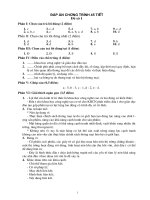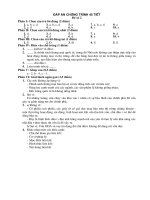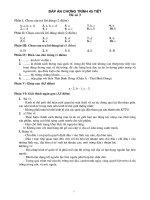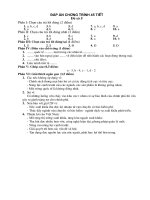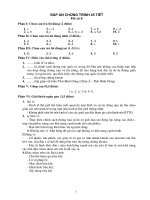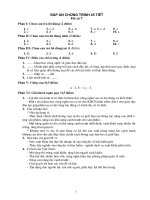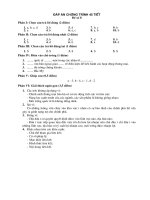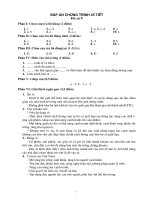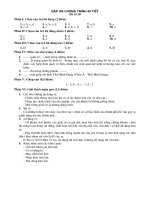- Trang chủ >>
- Đề thi >>
- Đề thi tuyển dụng
Đề thi tiếng anh công chức Thuế Hải quan Kho bạc Hành chính nhà nươc Viên chức ngành giáo dục 2023 (Có đáp án)
Bạn đang xem bản rút gọn của tài liệu. Xem và tải ngay bản đầy đủ của tài liệu tại đây (226.17 KB, 15 trang )
HƯỚNG DẪN ÔN TẬP MÔN TIẾNG ANH
PHỤC VỤ THI NÂNG NGẠCH LÊN CHUYÊN VIÊN
VÀ THI THĂNG HẠNG CHỨC DANH NGHỀ NGHIỆP VIÊN CHỨC
A. Hình thức: Thi trắc nghiệm trên máy vi tính
B. Nội dung:
Thí sinh được kiểm tra kỹ năng sử dụng ngôn ngữ, kỹ năng đọc, viết môn tiếng Anh,
dạng bài trắc nghiệm khách quan, mỗi câu hỏi bao gồm 04 phương án trả lời và chỉ có duy
nhất 1 phương án đúng. Trình độ bậc 2 theo quy định tại Thông tư số 01/2014/TTBGDĐT ngày 24 tháng 01 năm 2014 của Bộ Giáo dục và Đào tạo ban hành khung năng
lực ngoại ngữ 6 bậc dùng cho Việt Nam)
* Thời gian làm bài: 30 phút
* Số câu hỏi: 30 câu.
* Thí sinh thi đạt mơn ngoại ngữ khi trả lời đúng từ 15 câu hỏi trở lên.
***
1
I. Choose the word or phrase which best completes each sentence.
1. Many old people need someone to look ______ them.
a. on
b. after
c. at
d. off
c. haven’t bought
d. wouldn’t buy
2. If I were you, I ______ that camera.
a. didn’t buy
b. won’t buy
3. I'm not used ______ up early on Saturdays.
a. for getting
b. to getting
c. by getting
d. at getting
4. Yesterday I met the girl ______ grandfather had helped us with the project.
a. who
b. who’s
c. whose
d. that
c. shall we
d. would we
5. Let’s go to the movie, ______?
a. will we
b. will you
6. _____ he finished his homework, he played his guitar and sang.
a. Although
b. After
c.So that
d. Unless
7. This room is ______ to study. Please switch on the lights.
a. enough dark
b. dark enough
c.too dark enough
d. too dark
8. A lot of money ______on advertising every year.
a. spend
b. spends
c. is spent
d. are spent
c. Yes, I does.
d. Yes, I do.
9. Do you like classical music? ______
a. Yes, I likes.
b. Yes, I like.
10. They are going to go ______ vacation together.
a. on
b. with
c. to
d. of
11. The flight to London is cancelled because of ______.
a. heavy snow
b. snow heavy
c. snowing heavy
d. snow heavily
12. Can you see the woman ______ is sitting at that table?
a. whose
b. who
c. whom
d. which
13. The children slept deeply _____ the noise.
a. in spite
b. despite
c. although
d. because
14. She is very good ______ tennis. She never loses when playing with her friends.
a. at
b. for
c. in
d. on
2
15. It is______ interesting book ______ I have read several times.
a. such a…..that
b. such…..that
c. so…..that
d. such an…..that
16. I talked to ______ grandmother for three hours last night.
a. he
b. him
c. his
d. himself
c. about
d. of
17. It’s very kind ______ you to help me.
a. at
b. in
18. Do you ______ wear a uniform at school?
a. must
b. can
c. have to
d. don’t have to
19. ______ early on a sunny morning makes me feel good.
a. Walking up
b. Wake up
c. To walking up
d. Woke up
20. Martha was late for work this morning ______ she missed the bus.
a. even though
b. in spite of
c. therefore
d. because
21. Excuse me, I think you've ________ a mistake in our bill.
a. made Idiom “make a mistake” có nghĩa là phạm sai lầm.
b. done c. had
d. given
22. We ________ live in an apartment.
a. don’t
b. hasn’t
c. haven’t
d. doesn’t
23. It was impossible _________ because of the noise.
a. slept
b. sleeping
c. sleep
d. to sleep
24. Margaret as well as Jane ________ here since last week.
a. has been
b. was
c. were
d. have been
25. Tom is going to ________ to a new house.
a. be
b. move
c. meet
d. fall
26. Are you free ________ Thursday evening?
a. at
b. in
c. on
d. from
27. We have lunch ________ one o'clock.
3
a. at
b. to
c. in
d. on
c. speaking
d. to speak
28. Please ________ more slowly.
a. spoke
b. speak
29. What's your ________? I'm Canadian.
a. name
b. nationality
c. country
d. home
30. If I ________ you, I'd take some rest before the game tomorrow.
a. am
b. could
c. were
d. would be
31. Peter came to the meeting but Tom ________.
a. isn’t
b. hasn’t
c. didn’t
d. wasn’t
32. There's no need to be nervous. You're quite capable ________ your final exam.
a. of passing
b. passing
c. to pass
d. pass
33. You have never been to Ha Long Bay, ________?
a. have you
b. haven’t you
c. you have
d. you haven’t
c. How much
d. What
34. ______ is this blue bag? It's £9.49.
a. Where
b. How big
35. Who are you going to Canada______?
a. with
b. to
c. in
d. at
36. Peter and Sarah are going to ________ married.
a. have
b. fall
c. get
d. go
c. plate
d. bottle
37. I'd like a ________of coffee, please.
a. cup
b. glass
38. How old is your ________? She's fourteen.
a. brother
b. son
c. boyfriend
d. sister
39. It's very ________ in here. I can't hear anything.
a. noisy
b. quiet
c. exciting
d. clean
40. If Bob ________ with us, he would have had a good time.
a. had come
b.comes
c. has come
d. came
41. If I ________ enough money, I’d buy a new car.
a. had
b. would
c. did
d. shall
4
42. I’m not interested ________ sports.
a. for
b. about
c. in
d. to
43. If I ________ him, I would speak to him, wouldn’t I?
a. saw
b. had seen
c. have seen
d. would have seen
44. I’d really like ________ a new language.
a. to make
b. to do
c. to learn
d. to leave
45. We ________ to South Africa last year.
a.’ve been
b. went
c. go
d. are going
46. Don’t forget to ________ the light when you leave the room.
a. turn up
b. turn in
c. turn off
d. turn over
47. Excuse me, waiter. Can you bring me the ________, please?
a. note
b. money
c. bill
d. cheque
48. Many things which we can do now couldn't ________ years ago.
a. do
b. done
c. being done
d. be done
49. This is the cinema ________we saw the film.
a. when
b. which
c. that
d. where
c. worse
d. worst
50. This is ________ than I thought.
a. bad
b. badder
51. You ________ better stay at home so as not to give flu to others.
a. should
b. have to
c. had
d. have
52. She’s a very bad student. She is going to ________ the exam.
a. pass
b. fail
c. win
d. lose
53. I am expected ________ the result of last exam.
a. knowing
b. to know
c. know
d. knew
c. where is bank
d. of the bank
54. Can you tell me the way________?
a. to the bank
b. is the bank
55. We ________ lunch when you telephoned.
a. was having
b. had
c. were having
d. are having
56. Don’t ________ milk at the supermarket.
5
a. forget to buy
b. forget buying
c. forgetting to buy d. forget buy
57. Do you know what________?
a. time is it
b. time is
c. time is now
d. time it is
58. She ________eating since they arrived.
a. doesn't finish
b. hasn't finished
c. didn't finish
d. not finish
59. Simon has lived in this town ________ three years.
a. since
b. from
c. after
d. for
60. My grandparents ________ trees in the garden at the moment.
a. is planting
b. are planting
c. plants
d. be planting
61. I’m working ________ to pass my exam.
a. hardly
b. much
c. hard
d. good
62. They were very strict. They wouldn't let her daughter ________back home after 10
p.m.
a. come
b. coming
c. came
d. to come
63. She passed her English exam very ________.
a. easy
b. easier
c. good
d. easily
64. Please ________ on the door before coming in.
a. take
b. wait
c. try
d. knock
65. Do you ________ a uniform at your school?
a. carry
b. wear
c. use
d. hold
66. Take your umbrella. It's raining ________.
a. heavily
b. strong
c. hardly
d. much
67. ________time do you watch TV a day?
a. How old
b. How long
c. How much
d. How many
c. Were
d. Have
68. ________ you ever visited Ottawa?
a. Did
b. Do
69. We are very lucky, there are a lot of parks ________.
a. where we live
b. where live we
c. where do we live
d. where did we live
70. How much fruit juice ________ you ________ a day?
6
a. does/ drink
b. do/ drink
c. do/ drinks
d. does/ drinks
71. I can't stand ________ in hot weather.
a. to walk
b. walking
c. walk
d. to walking
72. Of the five students, Thomas is ________.
a. better
b. the best
c. good
d. well
73. We are looking ________ going on vacation next week.
a. for
b. after
c. through
74. Would you like some black coffee?
________.
a. No, please.
c. Yes, please.
b. Yes, I like.
d. forward to
d. Yes, I do
75. Can I ________ your dictionary, please. -Yes, of course. But I'd like it back for the
weekend.
a. lend
b. borrow
c. give
d. keep
76. I wish they wouldn't ________ so much time with unnecessary meetings.
a. waste
b. lose
c. take
d. put away
77. You can't ________ on him at all. He never does what he says.
a. tolerate
b. rely
c. collaborate
d. arrange
78. It's too expensive. We can't possibly ________ it.
a. pay
b. cost
c. afford
d. cope
79. That’s the most intelligent boy that I ________.
a. ever have known
c. have ever known
b. have ever knew
d. have knew ever
80. My mother went to the ________ to book a vacation yesterday.
a. travel agency
b. police station
c. art gallery
d. train station
81. I had a great vacation in England ________ I can’t speak English.
a. but
b. so
c. because
d. although
82. I think I’m open and friendly- I ________ with most people
a. get up
b. go on a date
c. hate
d. get along well
c. under
d. on
83. The toilet is ________ the first floor.
a. at
b. in
7
84. What would you like to ________? – A chicken rice, please.
a. drink
b. post
c. lend
d. eat
85. It is very hot here. ________ your coat.
a. Take off
b. Wear
c. Put on
d. Try on
86. You ________ a lot of interesting things in your life.
a. did
b. didn’t do
c. done
d. have done
87. This is ________ film I’ve ever seen.
a. the more interesting
c. more interesting
b. the interesting
d. the most interesting
88. What is she doing?
________.
a. She listens to music.
b. She doesn’t listen to music.
c. She is listening to music.
d. She listened to music
89. My son is arguing ________ his sister.
a. on
b. with
c. to
d. of
90. He showed us the house________he was born.
a. which
b. in which
c. in where
d. that
91. Have you finished reading the book ________ I gave you?
a. which
b. where
c. who
d. whom
92. He was late ________ he ran to the station.
a. because
b. but
c. so
d. although
93. The weather wasn’t ________ to go for a walk so they decided to stay at home.
a. too good
b. good enough
c. so good
d. such good
94. It is a very good ________ for you to show everyone what you can do.
a. attitude
b. talent
c. skills
d. opportunity
95. They’re playing very well. I think they are going to ________ game.
a. pass
b. fail
c. win
d. lose
96. A: I’m getting married next month.
8
B: ________
a. Possibly
b. Congratulations! c. Good luck
d. I don’t think so
97. My children and I like going to the ________ to see famous pictures.
a. travel agency
b. police station
c. art gallery
d. train station
98. Right now we ________ in a café in the main square.
a. sits
b. are sitting
c. is sitting
d. sat
99. A/An ________ person argues a lot and can be violent.
a. stylist
b. careful
c. serious
d. aggressive
100. I ________ down the street when it ________ to rain.
a. was walking/ began
c. walked/ began
b. was walking/ was beginning
d. walked/ was beginning
II. Reading
Read the passage and choose the best answer (A, B, C or D) to indicate the correct
word or phrase that best fits each of the numbered blanks from 1 to 5.
When you first apply for a job, you (1) ________ not succeed in getting it. It’s always a
good (2) ________ to ask them to explain to you what prevent you from beating the other
candidates. Don’t complain about the situation, but ask them to advise you (3) ________
what you can do better next time. Perhaps the interviewer disapproved of or disagree with
something you said. Perhaps they just glanced at your application and saw something that
made it easy to choose between you and another candidate. Don’t regard it as a failure, but
recognize it as a chance to learn more. (4) ________ you don’t worry too much about it
and continue to believe in yourself, you’ll eventually find the chance you’ve been waiting
for. Then, your family and friends will be able to (5) ________ you on your success.
1. a. might
b. would
c. will
d. must
2. a. method
b. means
c. opinion
d. idea
3. a. about
b. of
c. over
d. in
4. a. As far as
b. By far
c. So far
d. As long as
5. a. encourage
b. congratulate
c. promote
d. depend
9
Read the passage and choose the best answer (A, B, C or D) to indicate the correct
word or phrase that best fits each of the numbered blanks from 1 to 5.
In Germany, it's important to be serious in a work situation. They don't mix work and play
so you shouldn't make jokes (1) ______ you do in the UK and USA when you first meet
people. They work in a very organized way and prefer to do one thing at a time. They don't
like interruptions or (2) ______changes of schedule. Punctuality is very important so you
should arrive on time for appointments. At meeting, it’s important to follow the agenda
and not interrupt (3) ______ speaker. If you give a presentation, you should focus (4)
______ facts and technical information and the quality of your company's products. You
should also prepare well, as they may ask a lot of questions. Colleagues normally use the
family names, and title - for example 'Doctor' or 'Professor', so you shouldn't use first names
(5) ______ a person asks you to.
1. a. as
b. while
c. as if
d. such as
2. a. sudden
b. suddenly
c. abruptly
d. promtly
3. a. other
b. others
c. another
d. the other
4. a. on
b. to
c. at
d. in
5. a. if only
b. as
c. unless
d. since
Read the passage and choose the best answer (A, B, C or D) to indicate the correct
word or phrase that best fits each of the numbered blanks from 1 to 5.
Our classes take place for three hours every morning from Monday to Friday. The (1)
_________ class size is twelve and the average is ten. We use modern methods (2)
_________ teaching and learning, and the school has a language laboratory, a video camera
and recorders. You will only be successful in improving your English; however, if you
work hard and practise speaking English as much as you can. You will take a short (3)
_________ in English as soon as you arrive. In this way, we can put you in a (4) _________
at the most suitable level.
The emphasis is on oral communication practice in a wide (5) _________ of situations at
the advanced knowledge. You will learn how to use language correctly and appropriately
10
when you talk to native speakers. In addition, you will develop such study skills as reading
efficiently, writing articles and reports, and note-taking from books and lectures.
1. a. maximum
b. minimum
c. small
d. large
2. a. in
b. of
c. on
d. for
3. a. test
b. exam
c. course
d. lesson
4. a. form
b. class
c. grade
d. course
5. a. variety
b. amount
c. number
d. lot
Read the passage and choose the best answer (A, B, C or D) to indicate the correct
word or phrase that best fits each of the numbered blanks from 1 to 5.
Every child in Great Britain between the ages of five and fifteen must (1) _______school.
There (2) _______three main types of educational institutions: primary (elementary)
schools, secondary schools and universities.
State schools are free, and attendance is compulsory. Morning school begins at nine o’clock
andlasts until half past four. School is open five days a week. (3) _______Saturdays and
Sundays there are no lessons. There are holidays at Christmas, Easter and in summer. In
London as in all cities there are two grades of state schools for those (4) _______ will go
to work at fifteen: primary schools for boys and girls between the ages of five and eleven,
and secondary schools for children from eleven to fifteen years. The lessons are reading,
writing, the English language, English literature, English history, geography, (5) _______,
nature study, drawing, painting, singing, woodwork and drill.
1. a. attend
b. come
c. arrive
d. go
2. a. have
b. has
c. are
d. is
3. a. On
b. At
c. For
d. In
4. a. when
b. where
c. which
d. who
5. a. scientifically
b. scientific
c. scientist
d. science
Read the passage and choose the best answer (A, B, C or D) to indicate the correct
word or phrase that best fits each of the numbered blanks from 1 to 5.
Face-to-face conversation is a two-way process. You speak to me, I reply to you and so on.
Two-way (1) _______depends on having a coding system that is understood by both sender
11
and (2) _______, and an agreed convention about signaling the beginning and end of the
message. In speech, the coding system is the language like English or Spanish; the
convention that one person speaks at a time may seem too obvious to mention. In fact, the
signals (3) _______ in conversation and meetings are often (4) _______. For example,
lowering the pitch of the voice may mean the end of a sentence, a sharp intake of breath
may signal the desire to interrupt, catching the chairman’s eye may indicate the desire to
speak in a formal setting like a debate, a clenched fist may indicate anger. When (5)
_______ visual signals are not possible, more formal signals may be needed.
1. a. exchange
b. interchange
c. communication
d. correspondence
2. a. announcer
b. receiver
c. messenger
d. transmitter
3. a. that people use b. are used
c. using
d. being used
4. a. informal
b. non-verbal
c. verbal
d. formal
5. a. their
b.these
c. this
d. that
III. Choose the correct sentence from the given words.
1. goes / movies / usually / with / to / friends / she / on / the / Sunday / her /.
A. She usually goes to her friends with Sunday on the movies.
B. She usually goes to the movies with her friends on Sunday.
C. Her usually goes to with she friends the movies on Sunday.
D. She usually goes on the movies to her friends with Sunday.
2. went / morning/ the / we/ yesterday / to/ castle / see /.
A. We went to see the castle morning yesterday.
B. We went the castle to see yesterday morning.
C. We went yesterday morning to see the castle.
D. We went to see the castle yesterday morning.
3. your / brother / is / working / in / right now /?/ Australia /.
A. Right now is brother your working in Australia?
B. Your brother is working in Australia father right now?
C. Is brother working in your Australia right now?
D. Is your brother working in Australia right now?
12
4. vacation / are / to / we / go / month / on / going / next /.
A. We are on going to go vacation next month.
B. We are going to go vacation on next month.
C. We are going to go on vacation next month.
D. We are to going go on next month vacation.
5. you / do / problems / have / with / any / classmates / your /?
A. Do you have problems with your any classmates?
B. Do you have any classmates with your problems?
C. Do you have any problems with classmates your?
D. Do you have any problems with your classmates?
6. He/ is/ the / airport / in / waiting /Vancouver / for / at / Sarah / to / arrive /.
A. He is at in Vancouver the airport waiting Sarah to arrive for.
B. He is at the airport in Vancouver waiting for Sarah to arrive.
C. He is at the airport waiting in Vancouver for Sarah to arrive.
D. He at the airport is in Vancouver for waiting Sarah to arrive.
7. ’m / I / visit / my / going / to / uncle / next week /.
A. I’m going to visit my uncle next week.
B. I’m going visit to my uncle next week.
C. I’m visit to going my uncle next week.
D. I’m visit my uncle to going next week.
8. much / on / money / do / clothes / you / how / spend / ?
A. How much clothes do you spend on money?
B. How much money on do you spend clothes?
C. How much do you spend clothes on money?
D. How much money do you spend on clothes?
9. have / going / with / her / weekend / she’s / to / friends / this / dinner /.
A. She’s going to have dinner with her friends this weekend.
B. She’s going to have friends with her dinner this weekend.
C. She’s have going to her friends with dinner this weekend.
13
D. She’s going to with dinner have her friends this weekend.
10. class / who / youngest / the / person / the / in / is /?
A. Who is the youngest person in the class?
B. Who the youngest person in the class is?
C. Who is the person youngest in the class?
D. Who the youngest person is in the class?
11. much / shoes / expensive / more / are / your / bought / than /shoes / the / I /.
A. Your shoes are the more expensive than shoes I bought much
B. Your shoes are much more expensive than the shoes I bought.
C. Your shoes are more expensive than the shoes I bought much.
D. Your shoes are the much more expensive than shoes I bought.
12. my / but / you / must / can / carefully / you / car / drive / use /.
A. You can use my car, but you must drive carefully.
B. You must drive carefully, but you can use my car.
C. You must drive my car, but you can use carefully.
D. But you can use carefully, you must drive my car.
13. water / how much / a / you / do / to / need / drink / really / day / ?
A. How much really water do you need to drink a day?
B. How much water really do you need to drink a day?
C. How much do you really need water to drink a day?
D. How much water do you really need to drink a day?
14. coffee / he / how many / drink / cups / does / of / ?
A. How many does he drink cups of coffee?
B. How many cups of coffee does he drink?
C. How many coffee does he drink of cups?
D. How many coffee of cups does he drink?
15. football /our / at / often /students /weekend /the / play /.
A. Students often play our football at the weekend.
B. Our students play often football at the weekend.
14
C. Our students often play football at the weekend.
D. Students play often our football at the weekend.
16. you / have / finished / homework / yet / your / ?
A. Have you yet finished your homework?
B. You have finished your homework yet?
C. Have you your finished homework yet?
D. Have you finished your homework yet?
17. forward / from / am / you / to / I / looking / hearing / .
A. I am looking forward to hearing from you.
B. I am looking to forward hearing from you.
C. I am hearing from you looking forward to.
D. I am hearing forward to looking from you.
18. brother / now / My / staying / right / us/ is / with /.
A. My brother is staying right with us now.
B. My brother is staying right now with us.
C. My brother is right now staying with us.
D. My brother is staying with us right now.
19. neighbors / good / we / with / a / our / have / relationship /.
A. We have a relationship with good our neighbors.
B. We have a good relationship with our neighbors.
C. Our neighbors have a good relationship with we.
D. Our neighbors with we have a good relationship.
20. TV / My / at / usually / neighbors / night / watch / late /.
A. Neighbors usually watch late my TV at night.
B. My neighbors late usually watch TV at night
C. My neighbors usually watch TV late at night.
D. My neighbors watch usually TV late at night.
15
